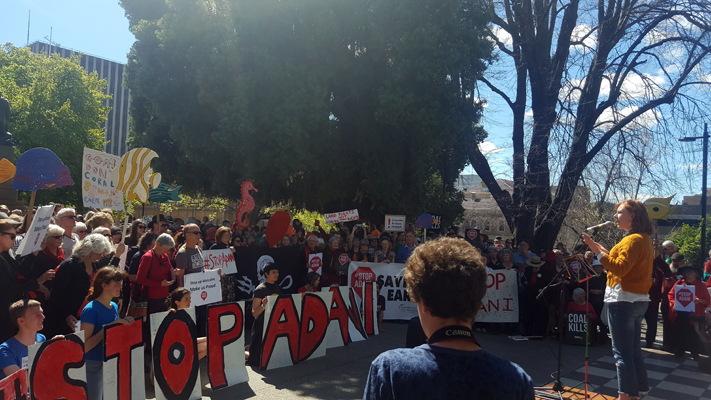Politicians are exploiting economic insecurity to put public resources into highly-questionable ventures.

Frances Roberts, Hobart co-convenor of the Australian Youth Climate Coalition, addresses a “Stop Adani” rally at Hobart’s Franklin Square last Saturday. PHOTO Martyn Summers
No-one should underestimate the fear that accompanies the threat of being sacked, the dismay that comes with being unemployed, or the lengths to which people will go to support a promise of a job.
There is no other explanation for governments behaving as if there is innate virtue in filling coastal waters with fish pens, felling forests or making huge holes in the ground.
Or allowing huge numbers of machines designed specifically to deprive people of their money to be installed in pubs and clubs across the country.
The selling of this latter idea as a benefit to society – a decades-long process which the Tasmanian historian James Boyce has described in his book, Losing Streak, in Talking Point and last month on national radio – would be utterly unbelievable if it had not actually happened.
Boyce reminds us that Tasmania’s installation of poker machines in the 1990s came after the Commonwealth Grants Commission found that this state had Australia’s worst rate of gambling addiction and its lowest level of revenue from gambling taxation.
Despite strong public opposition to poker machines in the 1990s, successive Liberal and Labor governments introduced them in stages and then abolished all bet limits. Bipartisan support was driven by a steady stream of tax revenue, but the public justification was local jobs.
Boyce points out that governments have turned a blind eye to the fact that the main beneficiaries of Tasmania’s pokie industry are not local clubs and smaller family pubs able to offer stable local employment but big, highly-profitable, mainly interstate hotel chains.
We can find similar stories about the privileges handed out to the forestry giant Gunns Limited before it came crashing down in 2012. Or about the relaxed attitude to what seem to be flagrant violations of marine environmental standards by the salmon farming business Tassal.
In all these cases there is disquiet in the community about undesirable social or environmental consequences. The salve for that disquiet is invariably jobs: in pubs and clubs, in forests, log transport and milling, and in salmon farms and factories.
Some of the promised jobs come to pass but most don’t, which is no surprise because it’s well known that spruikers of development proposals exaggerate. But it is interesting how quickly governments and voters alike can stop being sceptical as soon as jobs are raised in the conversation.
Now we have a stand-out national example of a large corporation and its political supporters making promises of many thousands of jobs in regional centres which, like Tasmania, have a recent history of chronic unemployment.
Last week the ABC’s Four Corners looked at past activities of the mining and energy giant Adani, the Indian group seeking to mine coal in Queensland’s Galilee Basin. The program raised financial, environmental and health issues and extensive evidence of fraud, bribery and money-laundering.
A recent judicial inquiry showed that Adani “just about broke every law of the country”, said Paranjoy Guha Thakurta, a leading Indian economist and intellectual. “Here is a business conglomerate who will not stop at anything to maximise its profits.”
The company’s power in its home state, Gujarat, was on full display after Four Corners reporter Stephen Long visited an Adani port facility to investigate the background of judicial findings against Adani for environmental misdemeanours there.
After being ordered off by Adani security, the film crew endured five hours of questioning at their hotel by police officers, who used a threat of arrest to force them out of town.
By contrast, Adani has lavished hospitality on federal and state MPs visiting India. That includes trade minister Steve Ciobo, who last month changed rules to allow the government’s Export Finance and Insurance Corporation to fund foreign-owned domestic mining projects.
EFIC’s charter has always been to help Australian companies enter foreign markets, but now its funds can be accessed by Indian-owned Adani. Major financial institutions have turned their backs on Adani’s Carmichael venture; if that fails EFIC’s own future could be under threat.
Another vocal supporter of the company is Queensland’s Labor premier Annastacia Palaszczuk, recently hosted in India by Adani’s owner, Gautam Adani. Questioned by Long, she said she knew nothing about multiple allegations of Adani money laundering and tax avoidance.
She added: “I do know about Adani and that means thousands of jobs for regional Queenslanders… You should go up there and talk to those people who have lost their jobs… They’re hurting, regional Queensland is hurting and we will do everything we can to get people back into work.”
Jobs promised – invariably more than what eventuates – say little about a business’s potential value and nothing at all about its viability. Adani admits its estimate of 10,000 jobs was grossly exaggerated, yet in this and many other cases such figures are driving seriously risky political decisions.
We expect companies to exercise due diligence with shareholders’ funds. Whether the business in question is coal, poker machines, trees or salmon, we should expect no less from governments.
THE ENERGY Market, to be held next week at Hobart’s Sustainability Learning Centre, is a brand new idea to celebrate, explore and create energy of all kinds. Anyone can attend. From 4 pm next Tuesday, 50 Olinda Grove, Mt Nelson.
